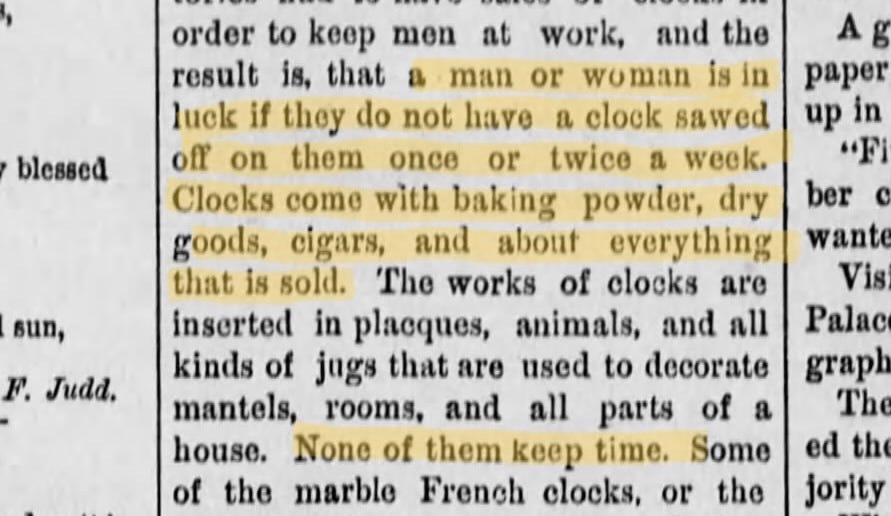🕰 🕰 🕰 Too Many Clocks! 🕰 🕰 🕰
🕰 🕰 🕰 🕰 🕰 🕰 🕰 🕰 🕰 🕰 🕰 🕰 🕰 🕰 🕰
On August 19th, 1785 Seth Thomas was born. He would go on to help pioneer early mass production - specifically in clock making - along with Eli Terry.
1805 saw the first mass production of clocks commence in Plymouth, Connecticut by Eli Terry (not to be mistaken with Eli Whitney, wrongly credited as kicking off the industrial revolution)
Seth Thomas would be hired by Eli Terry and would eventually start the famous Clock Company baring his name in 1813. The “era of cheap clocks” was on its way.
By 1886 time pieces were abundant and not everyone thought this was something to celebrate:

We found a piece lamenting the “era of cheap clocks”, which complained they were now bric-a-brac, rather than precious objects bought by newly weds and used for a life-time:
”A man or a women is in luck if they do not have a clock sawed off on them once or twice a week”
“Clocks come with baking powder, dry goods, cigars, and about everything that is sold… …none keep the time.”
It said some houses now contain so many clocks, that owners couldn’t keep them in sync - each would show a different time - so one could never be sure which was accurate. An hourglass it suggested was more reliable:
“The more clocks they have the less they know as to what of day or night.”
"Well, for heaven's sake, telephone down town and find out what time it is, and then take all the clocks in the house and trade them off for an hour glass."
⏰ Alarm clocks got a mouthful too:
“Of all the disgusting clocks, the alarm clock is the worst. An amateur sets the alarm for a given hour, but it goes off at some other hour invariable, and when the victim is awakened, and tries to chock off the alarm, the aforesaid alarm persists in singing its piece to the end.”
When technologies become abundant and cheap, they often go from being coveted and classy (penny farthings) to annoying and scorned (safety bicycle), no doubt a little classism is at play.



